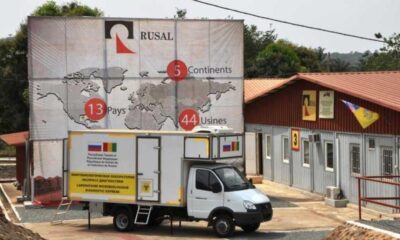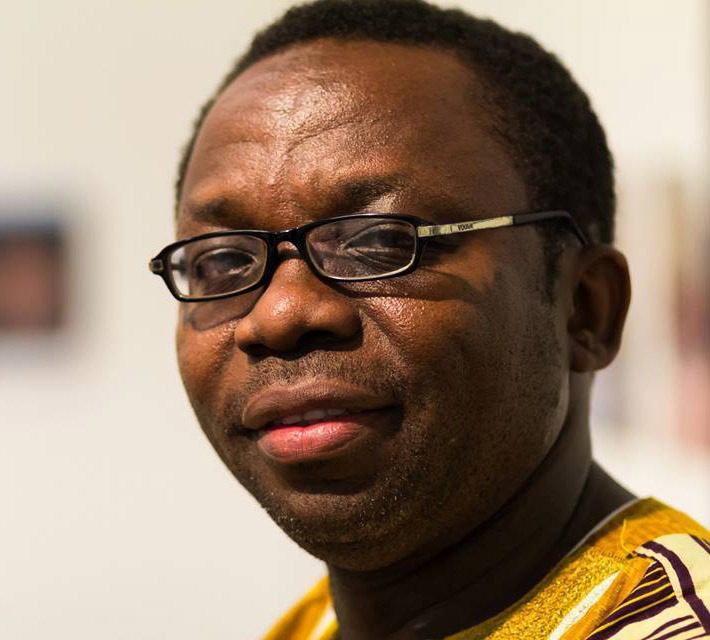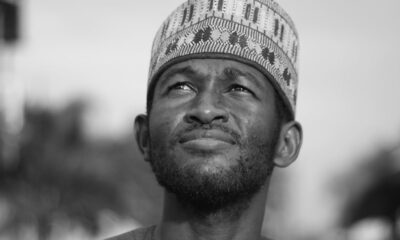National Issues
Why Nigeria Needs A True Agricultural Revolution -By ‘Tope Fasua

Cliches. Too many of them exist in Nigeria. If I had one naira for each time I’ve heard someone say, with all the intelligence they can muster, and lay their degrees on the line, that Nigeria should diversify into agriculture, or when government boasts that Nigeria will export agricultural products around the world to the furthest ends of the earth, I will be a billionaire by now. The problem is that in spite of the sound and fury around agriculture, not much has changed.
Let’s look at what is on ground. The government of the day says it has ‘repositioned’ rice production. That rice importation has gone down by 90 per cent. Only that the importation of parboiled rice into Benin Republic, our neighbour to the west and a sovereign collaborator of sorts with smugglers, has gone up by almost the same proportion. So the gains are marginal actually. The question is whether it is adequate, sustainable or sensible to ‘diversify’ by spending on a single crop, while claiming to have repositioned agriculture. Before we can claim any salutary victory in agriculture, I suggest that we will have to see sustainable, marked improvements across board. We will have to first be able to feed ourselves. We will have to see science in our agriculture. Our academia must have been meeting our farmers in the villages. Too much is left to artisanal farmers who are literally working their butts off.

We should have been wary. Now we hear that the floods from this year’s apparently heavy rainy season, may lead to lower yields in many rice farms next year. Many crop failures have occurred. I recall the year Nigeria focused on tomatoes. That was the year we saw ‘Tomato Ebola’. Akinwumi Adesina was here and bedazzled us with agricultural repositioning under the Jonathan government. We heard that they once bought 10 million phones for 10 million farmers to be able to monitor global prices and fertiliser delivery. I disagreed then that Nigeria couldn’t possibly have 10 million farmers. That would be 10 million households producing food, except we counted the farmers and all their children.
Let us look at what is happening elsewhere. We know that the rest of the world has always improved on whatever they do. I once passed a maize farm in Essex, U.K. and was shocked at the regularity of the crop for miles and miles. Their maize crop has been engineered not to grow too tall but to come out with standard cobs. That is science at work. That is the only thing that works. In most of Europe and the U.S.A, they have managed to keep the price of their staples – potatoes and bread – stable, sometimes for 50 years, subject to yearly inflation.
The other day, I was shocked to come across a conversation in a movie – Miss Sloan – on the Malaysian palm oil futures market. I then did a research and found that the Malaysians and Indonesians are not only producing almost 20 times what we are producing (individually), they have also developed the market for the product and all the derivatives thereof. There are primary, secondary and tertiary products and markets from this same palm oil that they got from Nigeria. People can even buy financial instruments whose underlying asset is palm oil! The examples that we need as a people are out there in the world. We only have to look.
The more embarrassing one for me is cocoa. I found out that Cote D’Ivoire is producing 10 times Nigeria’s cocoa. But that country is only a third of Nigeria, and they don’t plant cocoa all over the country. I admit that the French own the largest cocoa farms and processing plants in Cote D’Ivoire though. But the disparity in terms of agricultural performance should give us sleepless nights. My embarrassment is enhanced by the fact that cocoa is seen as the item in South-West Nigeria where I am from, and where we have the most professors. What have all our professors of agriculture, agronomy, extension, agricultural economics and so on, done for cocoa in South-West Nigeria? I believe that we can start to show activity in this area, and not until we achieve geographical restructuring in Nigeria. What can start to show ehat we will do in Oodua Republic now.

My personal experience with cocoa is that we leave a lot of it in the wild, overgrown by thickets, and only show up for harvest. The cocoa that our grandfathers planted is what almost the entire region still depends on. But for a recent initiative by the Osun State government to plant 50 million new trees, nothing is happening in that sector. Nigeria used to be the world’s largest exporter of cocoa, but while we revelled in self-importance and intra-country conflicts, not only Cote D’Ivoire, but Indonesia, Brazil and now Cameroon, haves overtaken us. To make matters worse, a report by The PUNCH newspaper early 2018 showed that vast swathes of the cocoa plantations, especially in Ondo State, are being replaced by Indian hemp crops, which are harvested in four months, as against the four to five years required for cocoa. Our youth are chasing money, and have no patience at all.
The core lesson is that no country is out there waiting for the day some country called Nigeria will produce enough food to export to her. The idea of agricultural production should therefore be calibrated toward, first, eradication of food poverty/hunger in line with the Sustainable Development Goals, and then food security. We need to produce food for ourselves first, before thinking about exports. But well, if we can do the two at the same time, why not? The only issue is that most of us are fixated on making dollars at the expense of greater exploits. This is why we went through the fiasco of yam exports in 2017. Recently we learnt that processed (dried) fish coming from Nigeria were again emptied into the Atlantic Ocean in the U.S.A because they failed some phytosanitary test or some documentation was omitted. We think too much about dollar, dollar, dollar. This is not the way to go. We sometimes deprive our neighbours basic cheap food because we are in a mad stampede to export for dollars.
The reality on ground is that our agricultural productivity is extremely low. Too low for comfort. And part of the reason for this is that we basically neglected folks who live in our villages and small towns to their own devises since 1960 and even before. The much celebrated growth and order of the early years of Independence is not real growth, but mindless neglect. Everyone who went to school was struggling to become urbanised. These were the same ones who ran governments. Tai Solarin’s admonition about our schools in those days comes to mind. He wanted Nigerian education to be calibrated towards tooling our students to create their own reality, rather than import other people’s realities. He lost the argument. Today, there are more Kings’ College graduates abroad than there are in Nigeria, and that is exactly what Tai Solarin warned about KC being too elitists with insular, disconnected graduates. And so we were saddled with a disconnect which has, over the decades, translated into the current disaster we are facing. We cannot expect to be fed by the emaciated, dying farmers we have left in the villages.
Serious Agricultural Countries
I did a bit more research in this area and found out the countries that exported the most in terms of agricultural products. U.S.A tops the list with close to $150 billion in yearly agricultural exports. Following closely is the Netherlands, a country which is about two thirds the size of Niger State in Nigeria, at just 41,000 square kilometers, in comparison to Nigeria’s 923,000 sq kilometres. The Netherlands exports $100 billion worth of agricultural products yearly, even if helps to process some of the products of other countries for export. This tells us clearly that agriculture is no longer dependent on land mass but on knowledge; on science. I researched into what they do in The Netherlands and found that they practice a lot of vertical farming. They also use a lot of greenhouses, which enable the country to plant all year round. The Chinese are also doing this and boosting farmers’ productivity by a factor of ten.
Other major agriculture export countries are Germany ($90 billion), Brazil ($80 billion), France ($75 billion), China ($65 billion) and so on. The 25th country on the list of food exporters, is Chile, with $17 billion worth of yearly exports. All OECD countries – the G8 countries, and upper income countries, are also major food exporters. We can see clearly that at less than $2 billion in year agriculture exports, Nigeria has just not started yet. Who exactly do we want to be exporting food to, if we wanted to really be serious? Have we added value to our species? Is it just about exporting to Nigerians in diaspora? Or are we exporting items as food that are then used as industrial products – like starch – out there? And what do we do about this mounting waste as our food exports are destroyed, burnt or dumped in the sea?
Further research, as captured in the foregoing attached numbers, shows the countries that sit atop the pack in terms of different crops. Sub-saharan countries, in general, features sparsely, whether in the production of cereals, vegetables, fruits, meat, dairy, nuts, spices or fibre. Nigeria does well with cassava, yam, potatoes, papaya, sorghum, okra and goat. In these we come between first and third in the world. Paradoxically, we have not seen any deliberate policy that will ensure our sustained relevance in these crops. We have focused on rice instead and left the others on autopilot, relying on the efforts of local farmers.
The other issue to resolve with agriculture is to determine what model we wish to run. If we want to give more encouragement to mechanised farming then we must determine what to do with our tens of millions of peasants, who must not be condemned to being mere farm hands in large capital-driven farms, as it has become the case in Kenya, Zimbabwe and South Africa. This later leads to insurrection and mass-dissatisfaction. If we don’t want to go down that route then we must begin to integrate our rural areas by considering them properly as part of Nigeria, because for now they are forgotten in a warp of time.
‘Tope Fasua, an Economist, author, blogger and entrepreneur, is presidential candidate of the Abundant Nigeria Renewal Party (ANRP), and can be reached through topsyfash@yahoo.com.

















